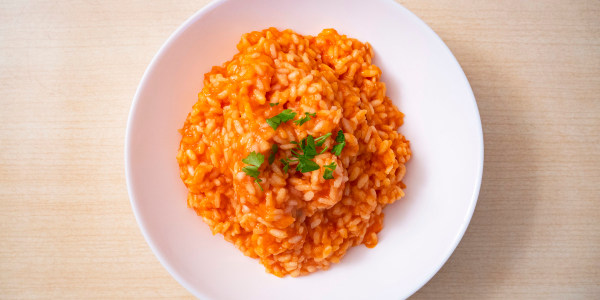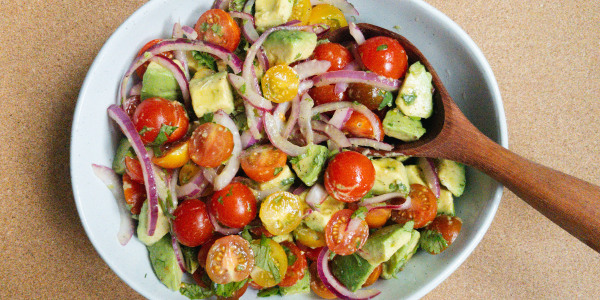Welcome to Start TODAY. Sign up for our Start TODAY newsletter to receive daily inspiration sent to your inbox — and join us on Instagram!
Ruby red tomatoes are the perfect complement to any sandwich, pasta or pizza. Although cherry, plum and beefsteak tomatoes are the most common varieties in the supermarket, there are more than 75 kinds of tomatoes out there. Just visit a local farmer’s market in the summer to find a gorgeous heirloom or green tomato.
Not only do tomatoes add juiciness and acidity to a dish, they are also packed with nutrients, like potassium and vitamin C. Tomatoes also contain a beneficial compound called lycopene, which has antioxidant properties. Lycopene is more available when exposed to heat, like in cooked tomato products such as tomato sauce. And that’s good news because research states that over 80% of all commercially grown tomatoes are used in tomato products, like soup, juice and sauce.
Let’s take a look at the health benefits of eating tomatoes, frequently asked questions about tomato products and yummy tomato recipes.
Tomato nutrition
One cup of tomatoes has:
- 32 calories
- 2 grams protein
- 0 grams fat
- 7 grams carbohydrates
- 2 grams fiber (7% daily value (DV))
- 25 milligrams vitamin C (28% DV)
What are the health benefits of eating tomatoes?
Tomatoes are an excellent source of vitamin C, a nutrient that is known for its role in immune health. Vitamin C contributes to many other bodily processes, such as wound healing, collagen synthesis, protein metabolism and iron absorption. This water-soluble vitamin is also an antioxidant that helps rid the body of harmful free radicals — atoms that damage the body's cells.
Tomatoes are rich in lycopene, a plant compound that has been studied for cancer prevention and heart protection. A 2022 review found that lycopene plays a role in preventing prostate cancer and breast cancer, two of the most common forms of cancer. Specifically, lycopene is thought to encourage cancer cell death.
Another review states that lycopene consumption reduces the blood concentration of insulin-like growth factor 1 (IGF-1), which plays a role in the development of breast cancer in pre-menopausal women. Lastly, a review of over 30 different articles concluded that there is an inverse association between tomato consumption and prostate cancer risk.
Beyond cancer, a tomato-rich diet has been linked to a reduction in the risk of heart disease. Several studies have found a link between lycopene consumption and a reduced risk of coronary heart disease. A separate meta-analysis concluded that high lycopene consumption was linked to lower incidences of mortality, cardiovascular disease and stroke.
Are tomatoes a fruit or vegetable?
Tomatoes contain seeds and are therefore a fruit. Technically, the part of the plant that bears seeds for reproduction is a fruit. The other parts of the plant, like the root, leaves and stems are classified as vegetables. Tomatoes are known as a vegetable because they are savory.
Tomato juice benefits
Tomato juice is a popular savory beverage choice. Although you can find 100% tomato juice, many other juice options combine tomatoes with other veggies, like carrots or beets. Tomato juice is a good source of nutrients, such as potassium and vitamin C, and it also has iron, vitamin A and fiber.
One thing to note: Tomato juice is quite high in sodium. The amount of salt in a serving of tomato juice varies by brand, but it’s usually upwards of 10% the daily value. Opt for a low-sodium tomato juice to avoid overdoing it on the salt, and limit your intake to 4 ounces per day.
Tomato soup benefits
Tomato soup is a simple plant-forward dish usually made with tomatoes, broth, seasoning and sometimes cream. The recipe for tomato soup varies based on whether it’s canned or homemade, and every recipe is slightly different. But, typically, tomato soup is a simple healthy meal or side dish that uses canned tomatoes as the base.
While the soup has lycopene, vitamin A and vitamin C, the dish may also be high in sodium. Again, it’s best to check the nutrition facts to see how tomato soup fits into your daily sodium needs.





